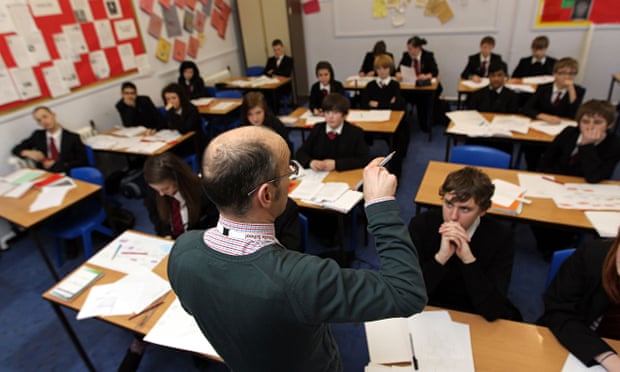Dubious
RETIRED MOD

- Joined
- Jul 22, 2012
- Messages
- 37,717
- Reaction score
- 80
- Country
- Location
- 30 October 2015
- From the sectionUS & Canada

This week, a South Carolina deputy was fired after throwing a student to the floor for refusing to leave a classroom. It's not unusual for police officers to work in US schools, but how does the rest of the world deal with student discipline?
According to reports, Deputy Sheriff Ben Fields was brought in to remove a pupil from class after she refused to give her teacher a phone.
Fields was onsite at Spring Valley High School in South Carolina as a school resource officer. School resource officers are police placed in a school full-time as part of a community policing practice, and assist with programmes to reduce crime, drug abuse, violence and provide a safe school environment.
In the 2013-2014 school year, 43% of US public schools had school resource officers on campus, according to figures from the National Center for Education Statistics. The figures also show that more than three in four high schools have armed security staff.
Following the investigation into the incident, Richland County Sheriff, Leon Lott, fired Fields for failing to follow "proper procedures," and said "the manoeuvre he used was not based on training, or acceptable."
However, Lott also said that the student should bear some of the blame as "the whole incident was started by this student."
Kenneth Zeichner, a Professor at the University of Washington's College of Education, specialises in student behaviour and classroom management, and says there is a protocol the teachers are encouraged to follow when students don't obey instructions - but force is not part of that.
When a student fails to co-operate with a teacher, the first step is to encourage a dialogue and get the student to leave the classroom. If this fails and the student continues to disrupt class, they are expected to bring in a more senior figure to negotiate compliance. Ideally, they would turn to a counsellor or social worker who could better engage the student.
"The goal is the safety of the students," says Zeichner.
In a worst case scenario, where the pupil continues to present an issue, the teacher may ask the rest of the class to leave.
Force should only have been implemented if weapons were involved or if there was danger to the other students, says Zeichner.
The BBC spoke to experts and correspondents around the world to find out how other countries deal with disobedient students.
The UK
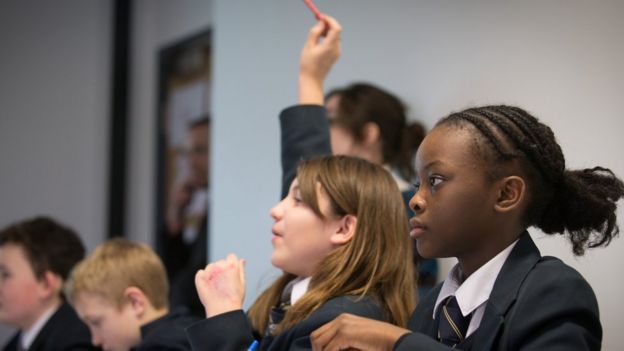
Police officers in schools are less common than the US, but not unusual. Safer School Partnerships (SSPs) were introduced in 2002, and by 2009, 5,000 schools had formal arrangements with the police. This means that almost 25% of all British schools have some form of police presence on premises.
Thomas Bennett, a school behaviour expert, was appointed by the government to assist teachers in addressing "low-level disruption" in class. He says officers would never be called in to remove a disobedient student at this level.
Officers are "a very good way for students to understand the consequences of their actions and legal rights. But it's very rare they would be used in a troublesome classroom." Bennett says an officer would only be introduced if something was stolen, a fight broke out or if drugs were involved.
However, there is no one protocol in the UK for handling students that refuse to co-operate.
"Teacher management training is relatively on-the-job, and often not addressed clearly. The vast majority of teachers would ask a student to leave the room. If they're quiet, teachers are advised to continue on with the lesson, then make sure they are suspended or removed from school after. If they're persistently disruptive, you ask for someone more senior to come along. The biggest mistake is that teachers think they have to deal with the student then and there."
This senior figure does not have to be a police officer, instead it can be a principal or counsellor.
"Police officers aren't there to keep the peace, they're there to help familiarise children with the idea that they can be there to help them."
Olivia Lace-Evans
Singapore
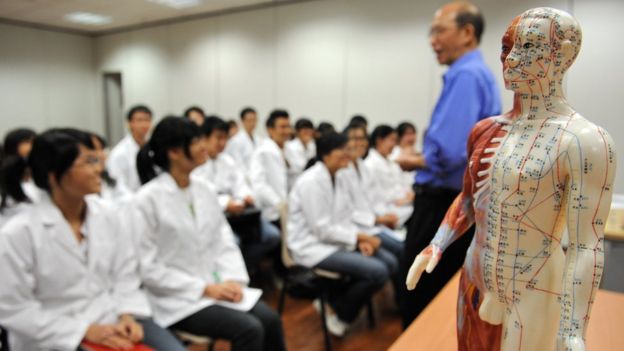
It may come as no surprise to outsiders that Singapore, notorious for caning convicts, allows corporal punishment for its students - but only in extreme cases.
Caning used to be a common school punishment in previous generations, but it has become tightly regulated after concerns that it was too harsh.
A pupil is punished "in instances of serious or repeated misconduct", and only in severe cases can they can be caned, says the Education Ministry.
Regulations specifically state that only "a light cane on the palms of the hands or on the buttocks over the clothing" can be meted out - and only for boys. Girls are explicitly exempted.
The punishment also comes with counselling and follow-up guidance, and parents are usually informed first.
Educators tell the BBC that corporal punishment remains rare in schools these days, used as a last resort. Other discipline methods include suspension and detention.
Teachers generally first take the approach of counselling and reasoning with students, particularly with older ones.
"Nowadays just telling students what to do or not to do is insufficient. We have to explain the rationale, and talk about the impact on others," one head of department in a local school told the BBC.
Police intervention is rare, and only where students have threatened teachers or other pupils - even then, the police tend to issue stern warnings rather than take action, another senior teacher told the BBC.
Tessa Wong
India

Corporal punishment is banned in India today and schools are very careful in their dealings with students.
"We cannot take any strict measures. Students, especially older ones in high school, can often be cheeky and get up to all sorts of mischief, especially with teachers who are young and newly recruited," Rashmi Virmani, who teaches 13 and 14 year olds at Delhi's Banyan Tree school, told the BBC.
But there is no use being aggressive, she says. "Today a teacher can't say, 'I'm a teacher and you're a student and you have to listen to me.' Being hoity-toity won't help. Students won't listen. But if you're nice to them, they will listen."
Ms Virmani says she has seen new teachers in tears, walking out of classrooms, unable to control students, but with experience, they learn to manage them better.
But there are times when students cross the line and they need to be disciplined, like when they "show the middle finger in class" or if they get involved in "a physical fight".
"To deal with indiscipline, we call the parents and in serious cases, we suspend a student for a few days," says Ms Virmani.
Geeta Pandey
Australia

As in all countries, Australia sometimes struggles to deal with very disruptive children within its schools. It is rare, but not unheard of, for police officers to be stationed within a school itself.
Earlier this year Walgett Community College in New South Wales became the first school in the state to announce two officers would be based at the campus after a spate of violent incidents. It came after mobile phone footage from the school showed a 13-year-old being badly beaten by fellow students.
New South Wales Police also run anger management classes for pupils. The state of Queensland also has a school-based policing programme, but bills this as a way of building better community relations rather than as a way of providing security.
In some states there is concern about a rise in the number of attacks on teachers by pupils, but generally having police officers patrolling within schools is seen as a last resort.
Jon Donnison
Japan
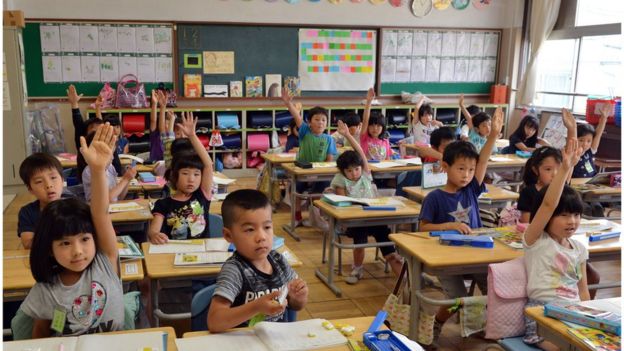
People may think Japanese schools are filled with well-behaved students who score high in international league tables. In part that is true. But since the 1990s there has been growing concern about rising levels of violence in Japan's schools. It reached fever pitch in 1997 when a 14-year-old student at a school in Kobe murdered two younger schoolmates, and cut off one of his victim's head.
School bullying has also become a recognised, and growing, problem. About 14% of children in Japanese schools are thought to suffer from chronic bullying. In July a 13-year-old boy at a school in northern Japan killed himself. An investigation found the boy had been repeatedly bullied, and that his teachers had done nothing about it.
What is far less reported is violence by teachers. Corporal punishment has been banned in Japanese schools since 1947. But many teachers continue to believe it is necessary, and many parents support them.
In 2012 an education ministry investigation found that teachers had physically punished more than 10,000 students in the previous year. That investigation followed the suicide death of a 17-year-old high school student in Osaka.
The boy had been captain of the school basketball team. After his death it was found the team coach had repeatedly slapped the boy in the face, in front of his team mates, on more than 30 occasions.
The proliferation of smartphones means some of the violence is now being caught on camera in Japan too. One short clip posted on the web two years ago purports to show a volleyball teacher at a school in Hamamatsu repeatedly slapping and verbally abusing a student.
Rupert Wingfield-Hayes
South Korea
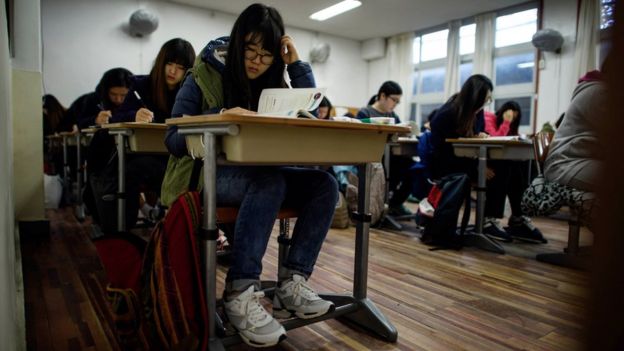
Teachers in South Korea were banned from hitting pupils in 2010 after shocking video taken on phones emerged of children being savagely beaten. The Korean Federation of Teachers' Associations accepted the morality of the ban on corporal punishment but said it would cause discipline problems in class.
Despite the ban, teacher violence against children has continued. Last year, a four-year old was seen being hit after she spat out some food she didn't want to eat. In another case, a teenager was repeatedly beaten.
Teachers are allowed to punish pupils with physical exercise. Last year, papers reported the case of a boy who had to be hospitalised after being made to do 800 squats for failing to do his homework.
So how is it now? One teacher in Seoul told the BBC that he feels helpless in the face of a disruptive class. "Our hands are tied," he said.
"The only thing you can do is make them stand at the back of the class. We ask them to be quiet".
Stephen Evans
How can a teacher remove a disobedient pupil? - BBC News



